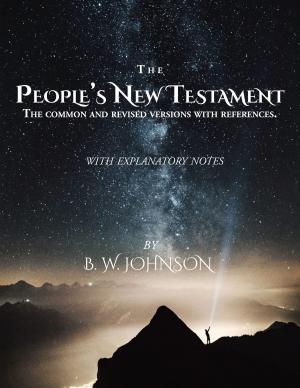Paul's Certainties
And Other Sermons
Nonfiction, Religion & Spirituality, Christianity, Christian Sermons, Bible & Bible Studies, Criticism & Interpretation, Study| Author: | J. D. Jones | ISBN: | 1230001930450 |
| Publisher: | CrossReach Publications | Publication: | September 24, 2017 |
| Imprint: | Language: | English |
| Author: | J. D. Jones |
| ISBN: | 1230001930450 |
| Publisher: | CrossReach Publications |
| Publication: | September 24, 2017 |
| Imprint: | |
| Language: | English |
No one can read the Epistles of Paul with any care without noticing in them a strange mingling of humility and assurance in the Apostle’s references to himself. The language of self-depreciation and the language of self-assertion are both to be found in his letters. When thinking of himself in the light of his past, Paul can find no language too strong to describe his own utter unworthiness; but when he is defending himself against the attacks of enemies and detractors, he asserts his dignity and authority in language that sounds almost boastful and egotistical in its vehemence. For instance, in one place he describes himself as ‘less than the least of all the saints;’ in another he proudly flings out the challenge, ‘Am I not an Apostle? Am I not free? Have not I seen the Lord?’ In one place he is abased to the very dust, and speaks of himself as the ‘chief of sinners;’ in another he confronts his calumniators, and becomes, as he himself put it, as ‘one beside himself’ in glorying, and says, ‘Are they Hebrews? So am I. Are they Israelites? So am I. Are they the seed of Abraham? So am I. Are they ministers of Christ? I more.’ In one place he speaks of himself as the ‘least of the Apostles, that am not meet to be called an Apostle, because I persecuted the Church of God;’ in another place, in answer to his accusers, he says, with magnificent but justifiable egotism, ‘I reckon that I am not a whit behind the very chiefest Apostle.’
Paul is a remarkable combination of humility and assurance; and this fact illustrates a similar remarkable combination in Paul’s references to his Apostolic knowledge. Just as we find that strange mingling of lowliness and righteous pride when he speaks of himself and his work, so we find a remarkable mingling of diffidence and positiveness when he speaks of what he knows. In one place he speaks with a certain hesitancy; in another with dogmatic assurance. In one place he ‘guesses at truth,’ and bids his readers take what he says as his opinion merely, and not as Divine revelation; in another he speaks with the certainty of one who has the mind of Christ. In one passage he confesses that he knows only in part, and prophesies only in part; in other passages he states truths the most vital and important and profound, and introduces them with a bold and unhesitating ‘I know.’
No one can read the Epistles of Paul with any care without noticing in them a strange mingling of humility and assurance in the Apostle’s references to himself. The language of self-depreciation and the language of self-assertion are both to be found in his letters. When thinking of himself in the light of his past, Paul can find no language too strong to describe his own utter unworthiness; but when he is defending himself against the attacks of enemies and detractors, he asserts his dignity and authority in language that sounds almost boastful and egotistical in its vehemence. For instance, in one place he describes himself as ‘less than the least of all the saints;’ in another he proudly flings out the challenge, ‘Am I not an Apostle? Am I not free? Have not I seen the Lord?’ In one place he is abased to the very dust, and speaks of himself as the ‘chief of sinners;’ in another he confronts his calumniators, and becomes, as he himself put it, as ‘one beside himself’ in glorying, and says, ‘Are they Hebrews? So am I. Are they Israelites? So am I. Are they the seed of Abraham? So am I. Are they ministers of Christ? I more.’ In one place he speaks of himself as the ‘least of the Apostles, that am not meet to be called an Apostle, because I persecuted the Church of God;’ in another place, in answer to his accusers, he says, with magnificent but justifiable egotism, ‘I reckon that I am not a whit behind the very chiefest Apostle.’
Paul is a remarkable combination of humility and assurance; and this fact illustrates a similar remarkable combination in Paul’s references to his Apostolic knowledge. Just as we find that strange mingling of lowliness and righteous pride when he speaks of himself and his work, so we find a remarkable mingling of diffidence and positiveness when he speaks of what he knows. In one place he speaks with a certain hesitancy; in another with dogmatic assurance. In one place he ‘guesses at truth,’ and bids his readers take what he says as his opinion merely, and not as Divine revelation; in another he speaks with the certainty of one who has the mind of Christ. In one passage he confesses that he knows only in part, and prophesies only in part; in other passages he states truths the most vital and important and profound, and introduces them with a bold and unhesitating ‘I know.’















